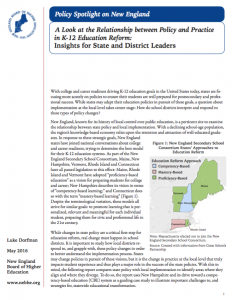 With changes to state policy in 2005, New Hampshire became one of the leading states in the nation in competency-based education school reform. The Granite State’s approach requires school districts to award high school diplomas based on a mastery of competencies (rather than the traditional measure of seat-time).
With changes to state policy in 2005, New Hampshire became one of the leading states in the nation in competency-based education school reform. The Granite State’s approach requires school districts to award high school diplomas based on a mastery of competencies (rather than the traditional measure of seat-time).
But state policy is only the first step in change: What makes a difference to students and families is how the policy is implemented. Ten years later, what’s happening in schools and districts in New Hampshire? As a case study for examining the relationship between policy and practice in K-12 education reform, NEBHE’s newest Policy Spotlight on New England, A Look at the Relationship between Policy and Practice in K-12 Education Reform: Insights for State and District Leaders, aims to find out.
Related Posts:
Putting Proficiency to the Test?
The Case for Competency-Based Education: A New Age of Teaching and Learning?
New Directions for Higher Education: Q&A with CAEL’s Tate on Prior Learning, Competency-Based Ed
[ssba]
